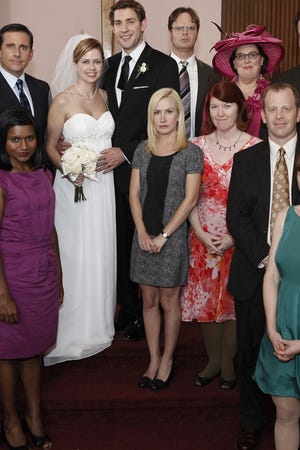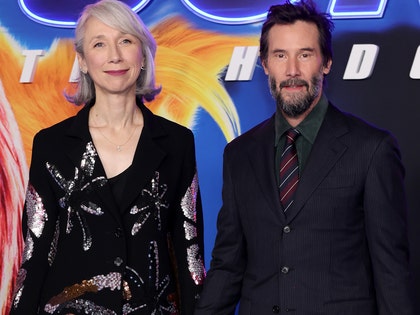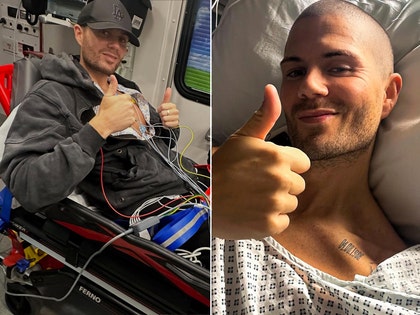 KURT ISWARIENKO
KURT ISWARIENKO
"I'm now out of the lemonade business."
Michael J. Fox believes a cure for Parkinson's is coming soon... but not soon enough.
In a new interview with AARP, the 60-year-old accepted the disease will not be defeated in his lifetime.
"As I wrote in my latest book, I'm now out of the lemonade business," he said. "I'm really blunt with people about cures. When they ask me if I will be relieved of Parkinson's in my lifetime, I say, 'I'm 60 years old, and science is hard. So, no.'"
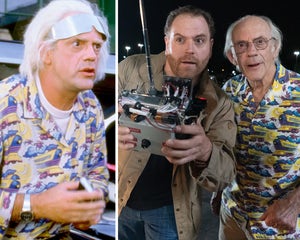 Everett Collection/Discovery+
Everett Collection/Discovery+
Christopher Lloyd Suits Up as Doc Brown for Back to the Future Series: 'It Was Kind of An Adventure' (Exclusive)
View StoryAnd yet, the "Back to the Future" star maintains his unfailing optimism, standing by his self assertion he is a "Lucky Man" — the title of his 2002 memoir — citing the unwavering love of his family, and the privileges his successful career brought.
"Still, it's hard to explain to people how lucky I am, because I also have Parkinson's," he said. "Some days are a struggle. Some days are more difficult than others. But the disease is this thing that's attached to my life — it isn't the driver."
"And because I have assets, I have access to things others don't. I wouldn’t begin to compare my experience to that of a working guy who gets Parkinson's and has to quit his job and find a new way to live. So, I'm really lucky."
"I'm kind of a freak. It's weird that I've done as well as I have for as long as I have," he admitted. "People often think of Parkinson’s as a visual thing, but the visuals of it are nothing... It's what you can't see — the lack of an inner gyroscope, of a sense of balance, of peripheral perception. I mean, I'm sailing a ship on stormy seas on the brightest of days."
The actor described how he pulled himself out of the prolonged "dark patch" he descended into in 2018 when, while recovering from surgery to have a tumor removed from his spine and relearning to walk, he fell at home, shattering his left arm.
"For one thing, I am genuinely a happy guy," he said. "I don't have a morbid thought in my head — I don't fear death. At all."
"But as I came through that darkness, I also had an insight about my father-in-law, who had passed away and always espoused gratitude and acceptance and confidence. And I started to notice things I was grateful for and the way other people would respond to difficulty with gratitude. I concluded that gratitude makes optimism sustainable."
 Getty
Getty
Michael J. Fox Recalls 'Pee-Holding Nightmare' Sitting Next to Princess Diana at Film Premiere
View Story"And if you don't think you have anything to be grateful for, keep looking," he added. "Because you don't just receive optimism. You can't wait for things to be great and then be grateful for that. You've got to behave in a way that promotes that."
He credited two other people with helping pull him out of his dark place: fellow Parkinson's sufferer and friend Muhammad Ali — and Marty McFly.
"Back to the Future! It's amazing — more people, of all ages, approach me now about that movie than ever before," he said. "I'm not sure I understood why. Then I came across it on TV last Christmas. And I thought I was really good in it, better than I thought I'd been. More important, I got the spirit of the movie."
"I understood it was just a big giggle and that we all need — and I mean the readership of this magazine, too — to take credit for what we've done and the lives we've touched and to occasionally step back a bit and appreciate that much of life has been great and that there's a lot more to live."
He continued: "Muhammad Ali helped me, too. I used to avoid watching myself on the TV shows I did when I was much younger, because I was healthier then and showed no signs of Parkinson's. But I wondered about Ali, whom I had become friendly with. He'd been such a beautiful athlete before Parkinson's."
"So, after he died, I asked his wife, Lonnie, if he ever watched recordings of his fights. 'He watched for hours,' she said. 'He loved it!' And I thought, 'Yeah, I should love it, too.' It's a legacy, some graffiti that leaves a message of positivity."
The star's self-named Parkinson's foundation has to date raised more than a billion dollars for research into a cure; while he accepts one may not be found in his lifetime, he remains optimistic it will be in others'. He said scientists are making promising progress in identifying biomarkers that will flag the disease before symptoms even set in.
 Getty
Getty
Michael J. Fox Recalls His 'Darkest Moment' of Parkinson's Battle
View Story"When I was diagnosed, I spent seven years keeping it to myself, not telling anybody and not learning about it, and I later realized others were isolated and didn’t have a central unifying force that would be their advocate," he lamented.
"So, now, along with pushing hard on the science through the foundation, I am a motivator and someone who tries to demystify and normalize Parkinson’s — to take away any shame or sense that it should be hidden. Because unfortunately, inevitably, it will reveal itself."
"There will always be people who say, 'Why do you have to keep telling me about it?' Well, the fact of my existence is evidence of this disease, and I'm not going to candy coat that for people."
Fox continued to act for three decades after his diagnosis, oftentimes channeling his condition into the characters he was playing — such as an unscrupulous lawyer on "The Good Wife" who used his symptoms to sway juries. "I loved the idea that disabled people can be a--holes, too," he recalled.
"When I couldn't act the way I used to act, I found new ways to act. But then I reached the point where I couldn’t rely on my ability to speak on any given day, which meant I couldn't act comfortably at all anymore. So, last year I gave it up."
Among his few professional regrets, he said, was being approached about "Ghost" but not pursuing it, although he admitted: "Now I can't imagine anyone other than Patrick Swayze doing it."
Asked what advice he had for people living with Parkinson's, he replied: "Have an active life and do not let yourself get isolated and marginalized. You can live with it."
"People sometimes say that a relative or a parent or a friend died of Parkinson's. You don't die of Parkinson's. You die with Parkinson's, because once you have it, you have it for life — until we can remedy that, and we’re working hard at it. So, to live with it, you need to exercise and be in shape and to eat well. If you can’t drive, find a way to get around. Maintain friendships. Don't say, 'Oh, I don't have anything to say to Bob.' Bob might have something to say to you. Just make the call."
Discussing his hopes for his legacy, Fox — who was named AARP's 2022 Purpose Prize honoree last month — cited his children's positive influence on the world, his work as an actor, anyone he's helped with Parkinson's... and one more impressive boast:
"Beyond that — and this is kind of a vanity thing — a lot of really great guitarists have come up to me over the years and said they picked up the guitar because of the “Johnny B. Goode” scene in 'Back to the Future'," he said. "If I did anything in this life, I got John Mayer to pick up the guitar!"
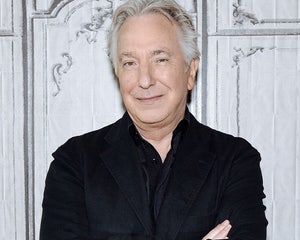 Getty
Getty








